2 min read
Proactive Cloud Management with Scheduled Reports
 Syeda Rukhaiya Kulsum Ganihar
:
Feb 15, 2023 11:29:00 AM
Syeda Rukhaiya Kulsum Ganihar
:
Feb 15, 2023 11:29:00 AM
Managing Cloud infrastructure can be a challenging task for many organizations. Cloud data collection and analysis are laborious and time-consuming processes requiring skilled experts with a broad understanding of hundreds of AWS services. Scheduled reports simplify the process by helping organizations keep track of Cloud infrastructure and usage. Organizations gain valuable insights to optimize performance, control costs, and ensure compliance.
In this blog, I discuss how customers benefit from reports and how customers can easily leverage and schedule over 30+ reports from MontyCloud DAY2 to manage cloud environments.
The Benefits of Scheduled Reports
Reports are a convenient way to stay informed and keep track of cloud infrastructure and usage. Customers schedule reports to automatically gather and deliver critical information on a periodic basis. In MontyCloud DAY2, customers schedule reports for their preferred cadence, scope (accounts/regions or projects/environments), and recipients.
For example, MontyCloud customers often schedule a monthly ‘Optimization Summary’ report to view resource usage and gain cost optimization recommendations. Customers use the report to improve cost and performance for projects, environments, accounts, and regions.
There are four ways scheduling reports benefit customers:
Time Savings through automation removes the need to manually collect data, identify insights, and deliver reports. Creation and delivery of reports may be automated by scheduling cloud reports, saving time and effort, but knowing the most recent knowledge of the cloud environment is available.
Increased Visibility identifies potential issues and opportunities for optimization across an organizations cloud infrastructure. Cloud report scheduling allows for better visibility into cloud infrastructure and usage, helping to identify potential issues and opportunities for optimization.
Proactive Management alerts organizations when conditions change to prevent escalations. Scheduling reports allows for proactive management of the cloud environment. For example, by scheduling a report that sends alerts when certain thresholds are breached, actions can be taken before an issue escalates.
Flexibility allows customers to customize reports to fit specific needs and requirements. Scheduling reports is customizable in order to fit specific needs and requirements.
Streamlining the Process: A Practical Guide to Scheduling Cloud Reports for Improved Management and Performance
Below, I will demonstrate how customers can schedule a weekly security report with step by step instructions to meet business needs.
Step 1:
Click ‘Reports’ in the sidebar to view all available reports in MontyCloud DAY2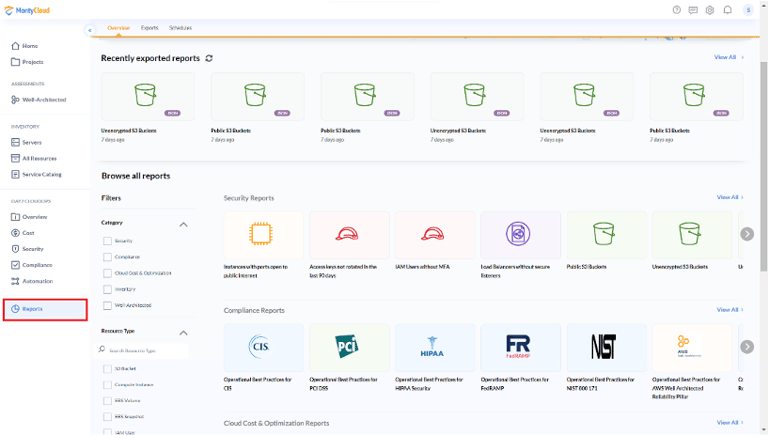
For this example, I want to schedule a report for `Instances with ports open to public internet`. Identifying AWS instances with ports open to the public internet can be an important step in maintaining the security of cloud infrastructure. This helps prevent unauthorized access and potential security vulnerabilities. Actions can be taken to mitigate and improve the security of instances. This proactive approach through regular reporting can ensure instances are secure while providing access to necessary services and applications.
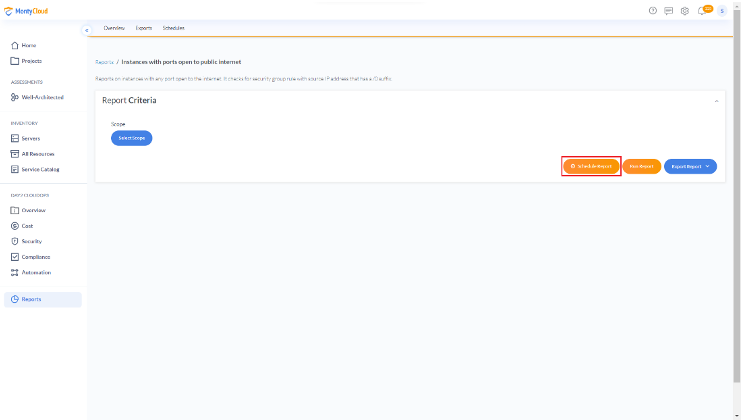
Step 2:
Provide necessary data to create a schedule.
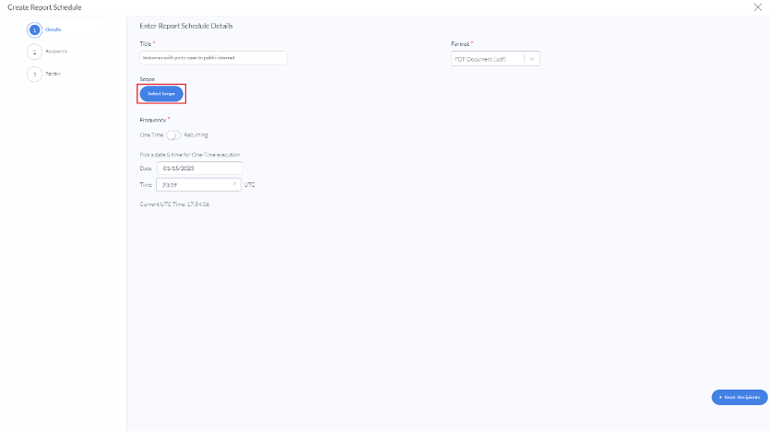
Select the scope (account/project/environment/region) for the report.

Select the frequency. In this example, we’ll use 10:00 AM, every Monday.
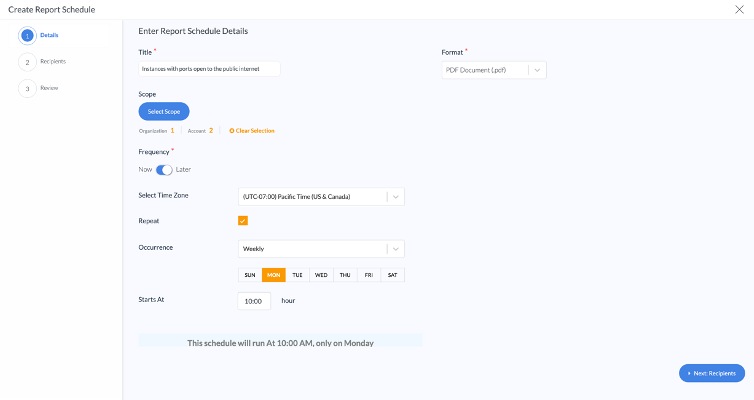
Select which recipients will receive the report on the ‘Notification’ page of the scheduling wizard, one or more recipients can be selected to receive the notification.
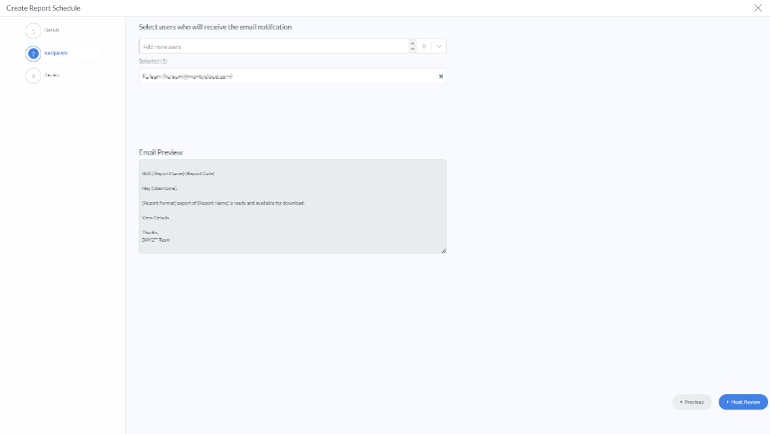
Step 3:
Once the report is generated, the recipient(s) will receive an email notification.

Step 4:
Download the report from the link in the email.
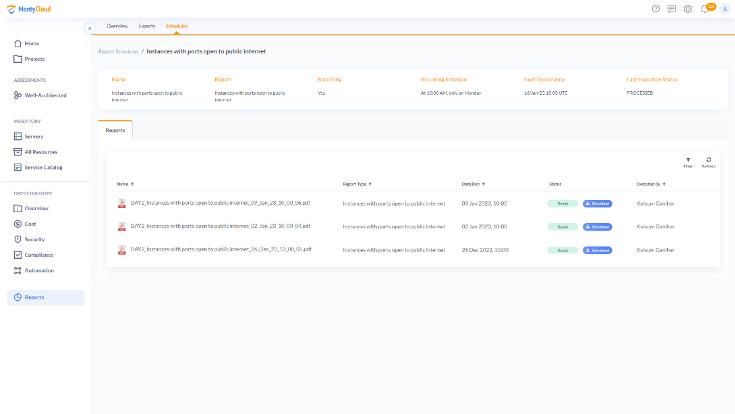
Step 5:
Review the downloaded report to gain insights.
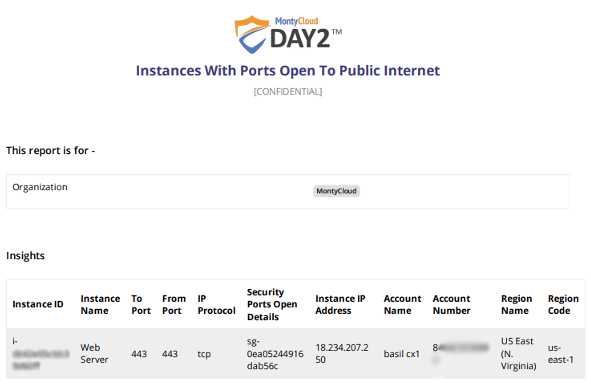
Conclusion
The ability to schedule reports for managing cloud operations improves efficiency, saves time and resources, provides greater visibility, allows for proactive management of the cloud and accountability. Scheduling reports over a long period of time gives the ability to track trends of cloud usage and costs, allowing for informed decisions to be made about the long-term cloud strategy. By leveraging this capability, cloud can be better managed and optimized to support business goals and objectives.



